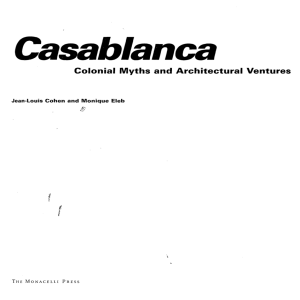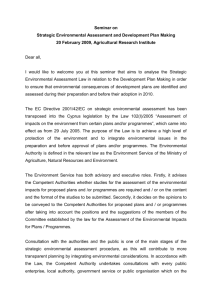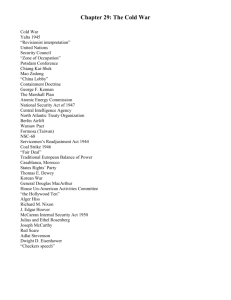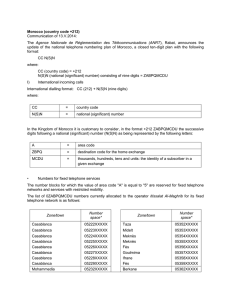TD United Nations Conference on Trade and
advertisement
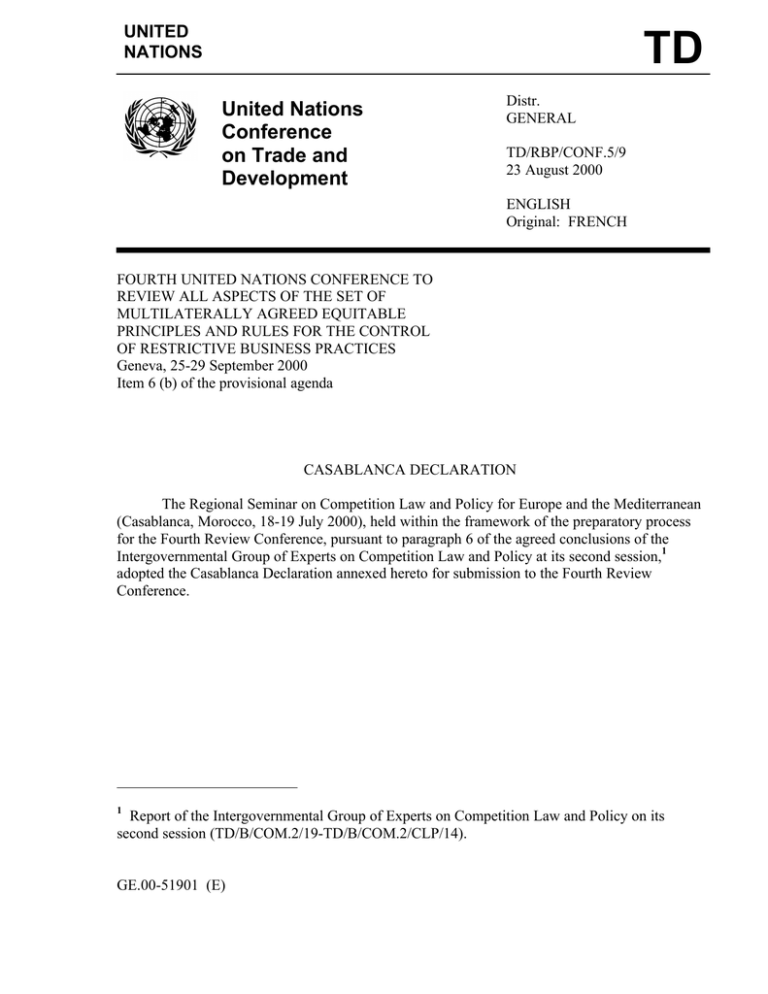
UNITED NATIONS TD United Nations Conference on Trade and Development Distr. GENERAL TD/RBP/CONF.5/9 23 August 2000 ENGLISH Original: FRENCH FOURTH UNITED NATIONS CONFERENCE TO REVIEW ALL ASPECTS OF THE SET OF MULTILATERALLY AGREED EQUITABLE PRINCIPLES AND RULES FOR THE CONTROL OF RESTRICTIVE BUSINESS PRACTICES Geneva, 25-29 September 2000 Item 6 (b) of the provisional agenda CASABLANCA DECLARATION The Regional Seminar on Competition Law and Policy for Europe and the Mediterranean (Casablanca, Morocco, 18-19 July 2000), held within the framework of the preparatory process for the Fourth Review Conference, pursuant to paragraph 6 of the agreed conclusions of the Intergovernmental Group of Experts on Competition Law and Policy at its second session,1 adopted the Casablanca Declaration annexed hereto for submission to the Fourth Review Conference. 1 Report of the Intergovernmental Group of Experts on Competition Law and Policy on its second session (TD/B/COM.2/19-TD/B/COM.2/CLP/14). GE.00-51901 (E) TD/RBP/CONF.5/9 page 2 CASABLANCA DECLARATION Under the auspices of His Majesty King Mohammed VI, the Seminar on Competition Law and Policy for the Euro-Mediterranean region was held in Casablanca (Morocco) from 18 to 19 July 2000, organized by the Ministry of General Government Affairs in partnership with the United Nations Conference on Trade and Development (UNCTAD). This seminar formed part of the preparations for the implementation of the national competition policy pursuant to the adoption by the Moroccan Parliament of the Price Liberalization and Competition Act (No. 6/99), and signalled the start of the publicity campaign by the Moroccan Government to promote new rules underpinning the culture of competition. The objectives of the seminar were: − To publicize the general provisions of the Act among the relevant judicial and administrative authorities and economic actors (producers, distributors, consumers); − To garner active support among economic actors, thereby ensuring better enforcement of the provisions of the Act; − To develop regional and international cooperation in the field of competition by multiplying shared experiences and deepening cooperation between the agencies and authorities responsible for competition; − To begin preparations for the Fourth United Nations Conference to Review All Aspects of the Set of Multilaterally Agreed Equitable Principles and Rules for the Control of Restrictive Business Practices and the United Nations model law on competition. The seminar was attended by representatives from all the Arab countries in the Mediterranean region, the European Union, and various African countries, and brought together prominent national and international experts, representatives of regional and multilateral institutions, community welfare associations, professional organizations, consumers’ associations, and political and academic figures. The participants drew inspiration and guidance from the statement delivered at the opening of the seminar by His Majesty Mohammed VI, the King of Morocco. There followed two days of studies and analyses, including very fruitful debates and discussions on anti-competitive practices, mergers and scenarios for the successful enforcement of competition law. The following conclusions were reached: − The encouragement of competition is a complementary element in any effort to modernize and upgrade an open economy in the context of the increasing globalization of markets. Price liberalization depends on fair competition and leads to technological innovation, development and social welfare; TD/RBP/CONF.5/9 page 3 − The task of ensuring that market rules operate smoothly through the monitoring of anti-competitive practices, unfair competition and the trend towards economic structures such as mergers and cartels is essential for market regulation; − The elaboration and enforcement of competition law are tasks which increasingly extend beyond national borders. The globalization of markets militates in favour of a multilateral platform and an intensification of cooperation between competition authorities; − The need to establish a Euro-Mediterranean framework to promote competition, in conjunction with efforts to develop bilateral agreements based on the common principles of non-discrimination, fair trade, transparency, and action to thwart strong cartels, is now widely accepted; − As tools for economic development, competition law and policy should take account of the distinctive features of individual countries. In every case, competition should create a climate favourable to trade and investment; − The role of UNCTAD is crucial in strengthening multilateral cooperation, ensuring the harmonization and convergence of competition law and policies, and publicizing a worldwide culture of competition with a view to securing an equitable division of the benefits of globalization while minimizing its adverse consequences. At the conclusion of the seminar, the participants recommended the following action by the Fourth Review Conference: − Make provision for technical cooperation programmes focusing on training and skills-acquisition in developing countries, including training for law officers and future executives responsible for overseeing competition, for example by developing regional cooperation and subregional technical assistance programmes; − Organize inter-country studies and exchanges with a view to securing increased convergence of competition law and policies; − Study the relationship between the enforcement of competition law and policy, the fight against poverty and the protection of consumer rights; − Assess the impact and social cost of the existence of national and international cartels; − Promote advocacy of a culture of competition in developing countries and the least developed countries; − Study the links between competition and regional integration; TD/RBP/CONF.5/9 page 4 − Examine the possibility of setting up a special fund to strengthen the capacities of competition authorities in developing countries through the allocation of a proportion of the fines imposed by such authorities on actors who engage in anti-competitive practices; − Establish an alert threshold for mergers all over the world, beyond which the relevant authorities would take joint action to preclude the formation of monopolies or over-dominant international positions; − Examine the most effective way to increase emerging competition authorities’ capacity to detect international anti-competitive practices; − Promote the adoption by the United Nations of a World Day dedicated to competition and consumption; − Study the connection between competition, investment and development; − Implement the proposal to set up a training centre for African competition authorities, such as recommended in the Tunis Declaration pursuant to the Third Review Conference in 1995; − Ensure that seminars similar to the Casablanca meeting on competition law and policies are organized in Euro-Mediterranean countries. Casablanca, 19 July 2000 -----
